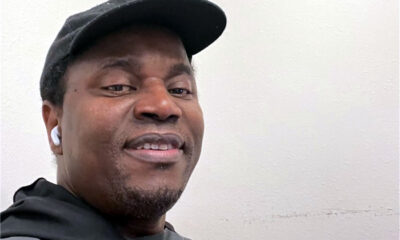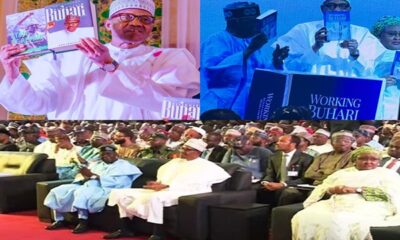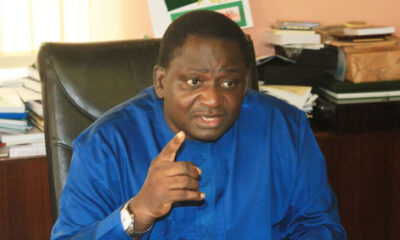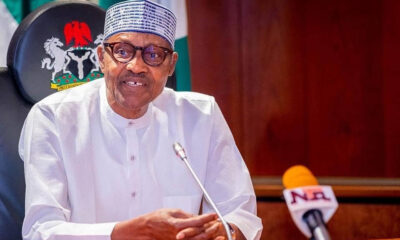Opinion
Wars and rumours of war – By Femi Adesina
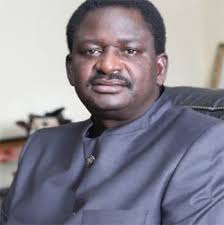
It’s often intriguing to hear eminent and well appointed Nigerians talk about disintegration, destabilization and outright war, as if it’s a picnic. War? Not a tea party, and not something you should wish even upon your enemy.
Nigeria fought a war before, in which about two million people died. There was sorrow, tears and blood, till good sense prevailed, and we said there was no victor, no vanquished. The scars of that internecine conflict are still very evident in some parts of the land.
Why then do some newspaper columnists, public commentators, ethnic warlords, even academics, talk of war as something they long for, an affliction they want to inflict their country with? War? Is it a picnic or tea party?
Hear what President Muhammadu Buhari once said to the agents of discord, beating drums of war: “Nigeria’s unity is settled and not negotiable. We shall not allow irresponsible elements to start trouble and when things get bad, they run away and saddle others with the responsibility of bringing back order, if necessary with their blood.
“I was distressed to notice that some of the comments, especially in the social media have crossed our national red lines by daring to question our collective existence as a nation. This is a step too far.”
Last Saturday, I took part in an international conference on Patriotism, Security, Governance, and National Development, organized by Global Patriot Newspaper in collaboration with Nigerian Consulate, New York and Nigerians in Diaspora Organization (NIDO), New Jersey Chapter.
If you ever wanted to know the Nigerian condition, and how some Nigerians see and perceive their country, you needed that kind of conference. Speakers included Vice President ‘Yemi Osinbajo, Senator Anyim Pius Anyim, Femi Falana SAN, Abike Dabiri Erewa, Prof Eddie Oparaoji, Dr Dakuku Peterside, Alhaji Abubakar Sokoto Mohammed, Prof Murtala Jide Balogun, Prof Olu Obafemi, Dr Akil Kalfani, Prof Apollos Nwauwa, and Engr Obed Monago, Chairman, Board of Trustees, NIDO America.
These speakers dissected what you could call the good, bad and ugly sides of Nigeria. And of course, the country has all those sides, and no mistake. That was why we once went to war, and till today, there are still rumours of war.
But should we ever fight again? And will we fight? I doubt, despite all the saber-rattling we hear around. War is no joke. It is no tea party or picnic, not minding those you hear stoking the embers daily. Like President Buhari said, they are “irresponsible elements” who will start trouble, “and when things go bad, they run away and saddle others with the responsibility of bringing back order, if necessary with their blood.”
What am I saying? Is Nigeria in a perfect state, nirvana, a Utopia? By no means. We all see things that exasperate us about our country. So, is cutting off the head the cure for headache? Is death wish for the country through the constant craving for war the way out, couched as warnings by some interest groups? For really, that is what they would wish to see, if only to have the morbid satisfaction of saying: we warned, they didn’t listen.
We have our grouses with Nigeria. The President often talks of missed opportunities, and yes, this country has missed many, over the decades. But he adds that those of them who have fought to keep this country together would never open their eyes and see Nigeria dismembered.
The international conference dissected the many problems of Nigeria, but one thing I felt could have been emphasized more was what I call loving our country, warts and all.
Loving the unloveable. That is what Nigerians need, if we would eventually get the country we desire. William Cowper, English writer, who lived between 1731 and 1800, said: “England, with all thy faults, I love thee still-my country.”
That is one thing we find lacking. We have not got to the point that we can say, Nigeria, with all thy faults, I love thee still-my country.
The Good Book says love covers a multitude of sins. And it does. But does it happen in respect of our country? Don’t Nigerians carry around giant-sized grudges against themselves, against their leaders, against the next ethnic group, and against their own very land? I have seen enough to make me conclude that the greatest problem of Nigeria are Nigerians themselves. They seem to hate their country. There was that atheist who said on his death bed. “I hate everybody. I hate God. I even hate myself.” That seems to be the experience of a good number of Nigerians.
Dr Dakuku Peterside, the immediate past Director General of NIMASA talked about patriotism and social contract, submitting that it is difficult to love a country that fulfills no obligation to the people. Correct. But love still covers a multitude of sins. When you love your country, warts and all, the shortcomings are easily understood and overlooked. We shouldn’t attempt to pull down the roof on everybody, simply because things are not done right or well. Nigeria, with all thy faults, I love thee still-my country.
The need of the hour is love for Nigeria, warts and all. Yes, there are many reasons not to love this land. But it’s the only one we have. We would be second class citizens anywhere else. Nigeria we hail thee. Our own dear native land.
The fault lines are many: ethnicity, suspicion of domination, religious differences, language, centrifugal forces. But, Nigeria, with all thy faults, I love thee still-my country.
That conference got it right. Patriotism, Security, Governance, and National Development. Nigeria needs them all. And like one of the speakers said, we need to ignite new spirit of patriotism in our country.
Do you know that some Nigerians actually gloat when things go wrong in the country? They rejoice at wanton killings, massive insecurity, prostrate economy, decrepit inter-ethnic relationships, and the like. They want things to fall apart in the ‘zoo.’ But Nigeria will survive. The singer, Veno Marioghae, said it long ago. Nigeria is like the testicles of a ram. It may sway from side to side as the ram runs, but it will never fall off.
It’s time we began to have a Nigerian agenda, instead of sectional agenda. It’s time we began to see the big picture, and wish our country well. Enough of wars and rumours of war.
Can we cavil less about our country? Can we emphasize less on things not done, and focus more on things being achieved? And I tell you, the Buhari government has stories to tell. Of rice pyramids, roads, rail, bridges, airports, massive infrastructure everywhere. Just on Thursday, the 13 Floor, Twin Tower ultra-modern Headquarters Building of the Niger Delta Development Commission was commissioned, about 26 years after it was conceived. And many of such projects abound. Let’s wail less, and appreciate more.
What we say often has a way of happening to us. “As you have spoken into my ears, so will I do to you.” (Numbers 14:28) Enough about war, destabilization, disintegration. “This generation of Nigerians, and, indeed, future generations, have no other country than Nigeria. We shall remain here and salvage it together.” Does that sound familiar?
Nigeria, with all thy faults, I love thee still-my country.
– Adesina is Special Adviser to President Buhari on Media and Publicity
Opinion
Our children must be kept away from Obi’s mob
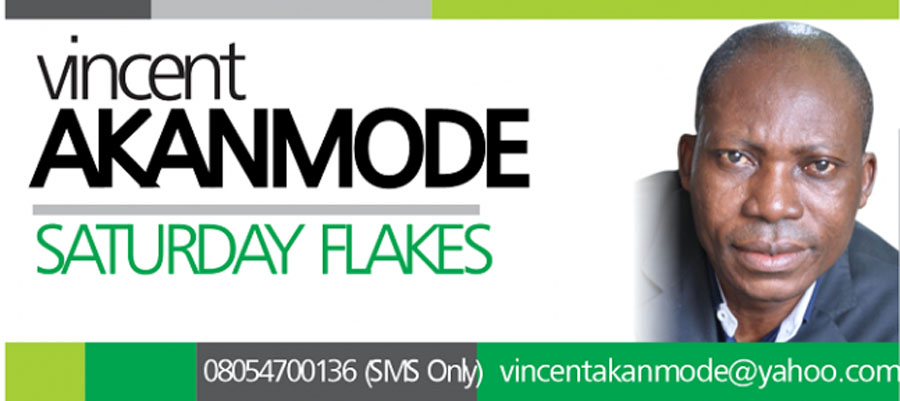
Our children must be kept away from Obi’s mob
Any Nigerian with an iota of conscience would be miffed at the content of a video that trended on the social media during the week. It was the motion picture of three children whose age ranged between 10 and 12 professing to be supporters of former Anambra State governor and presidential candidate of the Labour Party (LP) in the 2023 presidential election, Mr. Peter Obi. Oblivious in their pristine innocence that they were being initiated into the triple crimes of lying, cheating and forgery by those who contrived the issuance of voter cards to them, they heartily flaunted the cards meant only for adults above 18 years, threatening to vote Obi in the 2027 elections like they did three years ago.
Instructively, it was Obi’s supporters, led by the then Chief Spokesperson for the Labour Party Presidential Campaign Council, Dr. Yunusa Tanko, who embarked on a peaceful protest in Abuja against alleged registration of underage voters in the build-up to the 2023 elections.
During the campaign rallies that preceded the 2023 elections, the world had watched with bated breath as a 15-year-old boy identified as Alabi Quadri jumped into the road arms outstretched as Obi’s convoy approached during a campaign rally in Lagos. I was personally alarmed at the stupidity of young man’s action, seeing the possibility of him being hit by the advancing convoy of vehicles. But while I thought it was the dumbest act anyone could muster, Obi, rather than rebuke Quadri’s foolery, alighted from his vehicle, walked towards the scallywag and embraced him in the full glare of cameras. Obviously, the Labour Party presidential candidate was in full agreement that the rascal did very well staking his life for his (Obi’s) presidential ambition.
READ ALSO:
- BREAKING: Israel Launches Pre‑emptive Strike on Iran, Explosions Reported Across Tehran
- Popular Brain Supplement Amino Acid May Reduce Longevity in Men
- Amnesty Exposes Alleged Torture, Extortion, Deaths at Imo Police Tiger Base
Obi, who had earlier prided himself with not giving shishi (a dime), reportedly rewarded Quadri’s foolhardiness with an unspecified sum of money, which later put him into trouble with his colleagues and earned him a stay in Kirikiri prison for about three months after an alleged frame-up for armed robbery by some thugs in his Amukoko (Lagos) neighbourhood, who were said to be angry that Quadri did not deem them fit for a slice of Obi’s cake. They handed him over to the police, who kept him in custody until some human rights activists intervened and secured his release.
And before the dust generated by the sacrilegious utterance could settle, another teenager identified as Mc Aha from Imo State said he would gladly sacrifice his father and mother if that was all Obi needed to become the President of Nigeria. Commendably, the teenager’s obviously embarrassed father did not allow his son’s misguided utterance to go without a consequence. Convinced that the teenager’s outburst bordered more on crime than insanity, he ignored psychiatrists and psychologists and promptly handed his errant son over to the police.
I felt a sense of vindication on learning about the young man’s utterance, because a day or two earlier, I had been viciously attacked on Facebook for sarcastically posting that I once thought of becoming an Obidient but was discouraged by the long and tortuous process of having to undergo a surgery that would remove my brain and replace it with sawdust!
The question then arises: what exactly is the Obidient movement teaching our youths? What impact do Obi and his followers hope to make on the impressionable minds of innocent young boys and girls with the negative messages being passed to them by their mostly reckless, aggressive and abrasive older colleagues? A group that has turned discourtesy into an art. A group that has no place for the African culture of respect for the elder. A group to which age means nothing but sheer number. They address the elderly the same manner they do their apprentices and attack statesmen and eminent public office holders with the venom of a snake. A group whose leader is making a career of de-marketing his country and presenting his land of birth as the heaviest burden the rest of the world bears. What impact?
Our children must be kept away from Obi’s mob
Opinion
History and psychoanalysis of El-Rufai’s troubles with Ribadu – Farooq Kperogi

History and psychoanalysis of El-Rufai’s troubles with Ribadu – Farooq Kperogi
Given the depth and intensity of the friendship they cultivated over decades, many people are befuddled by why the personal conflict between former Kaduna State governor Nasir El-Rufai and National Security Adviser Nuhu Ribadu has burst into the open with such virulence. As I’ll show, it’s inspired by deep-seated envy, ego trip and bruised self-construal.
Both were born in 1960 (with El-Rufai being about nine months older), graduated from ABU in the 1980s (with El-Rufai graduating three years earlier), have a reputation for boldness and outspokenness, and were stars of the Olusegun Obasanjo administration.
From the outside looking in, it appears to me that although both men had mutual admiration for each other, the scale tilted a little in favor of El-Rufai. I say this for at least two reasons.
One, according to a recent social media post by presidential aide Gimba Kakanda, who appears to be close to both men, Ribadu named his son in honor of El-Rufai. I am not aware that El-Rufai requited Ribadu’s gesture even though he has had boys. If my assumption is wrong, I apologize. If it’s right, that bespeaks a deep, unspoken, but nonetheless significant inequality in admiration.
Second, on page 358 of El-Rufai’s 2013 autobiography titled The Accidental Public Servant, which has made the social media rounds, El-Rufai revealed that when the late Umaru Musa Yar’Adua sought Ribadu’s support to be president and said Obasanjo had already endorsed him, Ribadu rebuffed Yar’Adua, saying, “Well, Obasanjo has not told me, and as far as the presidency is concerned, I have my candidate for president, and that is Nasir El-Rufai. I am going to have to speak to Obasanjo about this.”
So, El-Rufai internalized the asymmetry in their admiration for each other. He took for granted that Ribadu thought higher of him than he did of Ribadu. There can be no greater endorsement of this fact than Ribadu’s perception that El-Rufai was the best Nigerian qualified to succeed Obasanjo.
READ ALSO:
- Troops Crush ESN/IPOB Hideout in Imo’s Mother Valley, Arrest Suspects
- Mikano, Autochek Target Financing Gap in New Push for Vehicle Ownership, launch virtual showroom
- Presidency Mocks Atiku After Fintiri Defects to APC, Urges Him to Retire to Dubai
However, in 2011, when Bola Ahmed Tinubu was shopping for a young northern candidate to fly the flag of the ACN, he commissioned a public opinion poll to determine which northern candidate enjoyed the most national acceptance, according to Akin Osuntokun’s February 20, 2026, Arise News interview.
Osuntokun not only worked with both men during the Obasanjo presidency, he is also friends with them. Plus, I’ve heard this story from several people close to El-Rufai and Ribadu, but this is the first time it’s out in the open.
Osuntokun’s revelation that the national poll showed Nuhu Ribadu with a significantly higher rating (about 45 percent) compared to Nasir El-Rufai (around seven percent) is consistent with what I’ve heard.
Based on that result, Tinubu backed Ribadu’s candidacy within the ACN. It also marked the beginning of Ribadu’s relationship with Tinubu.
El-Rufai’s exaggerated self-construal of his superiority over Ribadu was badly shattered, and he couldn’t take it. But I am not surprised by the outcome of the poll. It occurred at the height of Ribadu’s popularity in the country.
As I pointed out in a past column, my own paternal uncle, a UK-educated health professional, named his son Ribadu, not Nuhu, in honor of Nuhu Ribadu’s exploits at the EFCC. When I told him Ribadu is the name of a town in Adamawa State where Nuhu hails from, he was surprised. We still laugh over it.
El-Rufai’s ego was badly bruised because he had a hard time accepting that Ribadu, who didn’t think of himself as presidential material in 2007 and who instead thought El-Rufai should succeed Obasanjo, should be considered worthier of being president in 2011 by more Nigerians. As a result, the previously impregnable walls of friendship between them began to collapse irretrievably.
By 2015, El-Rufai rode on the coattails of Muhammadu Buhari to become governor of Kaduna State. According to people familiar with the dynamics of their relationship, El-Rufai studiously used his influence in the Buhari government to exclude Ribadu.
But by 2023, when Tinubu became president, Ribadu got his groove back. El-Rufai believes that the rejection of his ministerial nomination by the Senate on “security” grounds was inspired by Ribadu, who was retaliating for El-Rufai’s own underhanded exclusion of Ribadu during the Buhari presidency.
READ ALSO:
- Amaechi Reveals Buhari Refused Electoral Bill Over Russia Hacking Fears
- Alleged Forgery: Court Grants Mike Ozekhome, Co-Defendant ₦10m Bail Each
- Alleged Terrorism: Court Grants ₦200m Bail to Malami, Son, Orders Remand in Kuje Prison
Most regular people with no hangups would take it in their stride and wait for their “time.” But El-Rufai isn’t a “regular” person. He must be in on the action or everything must be scattered. So, he set out to do at least three things to get at Ribadu: 1. Show that Ribadu is dangerous and vindictive. 2. Show that he is incompetent. 3. Show that he is a craven fellow who can’t return, much less match, El-Rufai’s lethal rhetorical salvos.
These points overlap. If you are vindictive but are afraid of being seen as such, then you’re a coward. If you’re a coward and you control the security of the country, then you’re also incompetent. If you don’t respond to my personal attacks, it’s because you fear that I’ll reveal more damaging information and also lack the rhetorical and intellectual firepower to fight back, which harkens back to your fitness for the job of protecting the country.
Of course, El-Rufai knows that Ribadu is anything but a coward. In The Accidental Public Servant, El-Rufai recounts an incident from their undergraduate days at Ahmadu Bello University to illustrate what he presents as Ribadu’s boldness.
According to El-Rufai, Ribadu was confronted by an armed robber who pointed a gun at him. Instead of complying or retreating, Ribadu slapped the robber and challenged him.
El-Rufai told the anecdote as an example of Ribadu’s fearlessness and impulsive self-confidence during their student years and to sketch Ribadu’s temperament early on, suggesting that Ribadu’s later public persona as an anti-corruption crusader was consistent with traits visible even as an undergraduate.
In his only public reaction to El-Rufai’s constant personal attacks, Ribadu was conciliatory and even-tempered. “Despite the incessant baiting and attacks, I have never spoken ill of Nasir on record anywhere,” he wrote on February 24, 2025. “This is out of respect for our past association and our respective families. I will not start today.”
El-Rufai’s supporters read the statement, whose grace should have disarmed anyone, as evidence of cowardice. But had he attacked El-Rufai back in the fashion that El-Rufai savaged him, the public, which tends to side with the underdog (in this case anyone outside the orbit of the reigning government), would see El-Rufai as the victim and Ribadu as the villain.
This gave El-Rufai the illusion that he was winning the war and led him to dig in even deeper with that self-sabotaging Arise News interview, which overstepped the bounds of reasonableness and landed him in the hot water he is in now.
In spite of people’s natural predilection to sympathize with the underdog, outside of partisan political circles, El-Rufai’s troubles aren’t eliciting the profusion of support, outrage and empathy anyone else would have received. And it’s because he is being given a taste of his own medicine.
For those who want to sympathize with him, which is perfectly legitimate, I leave you with these words he uttered on January 22, 2012, at the Yar’Adua Center, Abuja, at a presentation at the T2T (Transformed To Transform) Nigeria Conference for Youth Corps Members:
“We have no politics of public interest or public good. And you know the politicians proudly tell you that politics is about interest. If they don’t get what they want, they’re ready to collapse the system.
“Every military coup in Nigeria’s history was engineered by civilians. They have lost elections, right or wrongly. If a politician contests for a position and he doesn’t get it, he’ll not support a party member that got the nomination.
“He would rather move to the opposition and ensure that the person that defeated him fair and square loses the election. So, we have a political culture where the primacy of personal interest trumps everything else.
“Now, what is the difference between human beings and animals? So it is with most Nigerian politicians: everyone for himself, no one for the country, no one even for the party. It’s an interesting political culture. And it’s ingrained. Politicians believe that is the way, that is politics, and to change it will take quite an effort. This is a problem.”
History and psychoanalysis of El-Rufai’s troubles with Ribadu – Farooq Kperogi
Kperogi is a renowned Nigerian columnist and United States-based Professor of Journalism.
Opinion
Tinubu must address rising mass massacres now, By Farooq Kperogi

Tinubu must address rising mass massacres now, By Farooq Kperogi
Recent events show a widening pattern of killings, abductions and reprisals stretching from Borno to Zamfara, Kebbi, Niger, Kwara and elsewhere. The scale of fatalities alone demands sustained national attention. But the Bola Ahmed Tinubu government’s muted presence in the public response raises troubling questions about its priorities and its appreciation of the fierce urgency of the moment.
Start with Borno State, long regarded as the epicenter of Boko Haram’s insurgency. International media outlets reported last Friday that Boko Haram militants attacked a Nigerian military formation, killing at least eight soldiers and leaving dozens wounded. Casualty figures varied across accounts, but the deaths of eight soldiers were consistently reported.
Incidents of this nature once triggered nationwide debate and highly visible federal reaction. They now pass with limited public engagement outside specialist security coverage. That shift in attention probably reflects outrage fatigue, but it does not reduce the severity of the threat.
In the northwest and north central zones, mass casualty attacks have become distressingly frequent. Reports from Kebbi and Zamfara States describe repeated bandit raids, civilian deaths and abductions.
Again, an Associated Press dispatch from last Friday documented coordinated assaults in Kebbi resulting in at least 33 fatalities. That number alone represents a catastrophic loss for rural communities, yet the federal government hasn’t even acknowledged these tragedies much less comfort victims. This is increasingly becoming a pattern.
The Borgu region, where I am from, illustrates how violence transcends state boundaries while policy responses remain fragmented. Borgu’s communities span Kebbi, Niger and Kwara States. They share historical and cultural ties but operate under different administrative authorities.
READ ALSO:
- Armed Bandits Kill 30, Kidnap Villagers in Zamfara Attack
- Agege Council Announces Free 3kg Cooking Gas Refill for 4,000 Residents
- Tinubu Summons Aiyedatiwa Over APC Congress Violence, Monarch’s Murder
Armed groups exploit this fragmentation. Attacks in one area of the region reverberate across others and reshape daily behavior far beyond the immediate site of violence.
In Tungan Makeri, Konkoso and Pissa in Borgu Local Government Area of Niger State, news reports and police statements from this week confirmed deadly pre-dawn raids by gunmen. Initial figures indicated about 32 civilians killed across the affected settlements.
Specific breakdowns varied, with six deaths reported in Tungan Makeri and as many as 26 in Konkoso, according to local accounts cited in early coverage. These numbers represent entire families extinguished within hours. They also underscore the persistent vulnerability of communities repeatedly targeted by armed groups.
Earlier in the year, Borgu recorded another mass casualty episode at Kasuwan Daji market. Credible reporting placed the death toll at 30 or more people killed, with several others abducted. Shops were burned. Civilians were shot. Survivors described chaos, devastation and disorientation.
The recurrence of large-scale lethal attacks within the same geographic zone should have triggered an unmistakable escalation in federal visibility. That response has not been evident at the level many residents consider commensurate with the losses.
Across the Kwara axis of Borgu, the psychological impact of nearby massacres is now frighteningly noticeable. In Baruten, formerly part of the historical Borgu configuration, fear recently overwhelmed a weekly market day.
A vehicle passed through town. Someone suspected it might be transporting terrorists. The reaction was immediate and visceral. Traders and buyers fled. Goods were abandoned. People ran without coordination, and injuries followed. Some residents reportedly broke limbs in the stampede. Elderly individuals fell and required hospitalization. Many retreated indoors, remaining inside overheated rooms for hours. Goods abandoned in the market were stolen.
But no attack occurred. The vehicle posed no danger. It was the panic itself that inflicted the harm. This happened in my hometown on a Wednesday, a bustling market day that serves as both an economic outlet and a space of interaction, exchange and communal vitality.
Such reactions are not irrational. They reflect what psychologists call learned responses in environments where credible violence repeatedly erupts nearby.
In adjacent Kaiama Local Government Area of Kwara State, residents recount continual episodes of extreme brutality in the hands of bloodthirsty terrorists, the recent mass slaughters in Woro and Nuku that captured the national and international attention being the latest.
Residents across Borgu consistently describe a sense of exposure and disabling siege. In the Niger State sector, communities report repeated attacks on the same settlements. In Konkoso, for example, locals say after militants killed large numbers of villagers, the assailants returned on February 17 to burn the remaining homes. Whether every detail withstands subsequent verification, the pattern of repeated raids across the region is corroborated by multiple independent reports of killings and abductions.
READ ALSO:
- FCT Polls: S’Court, A’Court Defy Wike’s Public Holiday, Continue Judicial Activities
- Lassa Fever Deaths in Nigeria Rise to 51 After 15 Killed in Early February – NCDC
- Mob Kills Injured Motorcycle Rider After AK‑47 Rifles, Ammunition Found in Crash Scene
Governmental reaction shapes how citizens interpret both tragedy and state legitimacy. In Kwara State, the governor’s visit to sites of violence in Kaiama was widely noted by affected residents. Such gestures cannot reverse fatalities, but they acknowledge suffering and communicate presence. Insecurity is not only a military problem. It is also a political and psychological one.
In contrast, many inhabitants of Niger State’s Borgu communities express dissatisfaction with the state government’s posture following major incidents. Residents recount episodes in which official statements emphasized blame.
After the Papiri abductions, villagers say responsibility was publicly shifted toward school authorities without a gubernatorial visit to the affected location. Following reports that more than 70 people were killed in Kasuwan Daji, locals similarly describe narratives of fault attribution unaccompanied by direct engagement with survivors. These perceptions may not capture every administrative constraint, but they significantly influence public trust.
The more pressing concern, however, lies at the federal level. The cumulative death toll across Borno, Kebbi, Niger and Kwara States in just these few cited incidents exceeds any threshold that should trigger unmistakable national urgency.
Eight soldiers killed in Borno. Thirty-three civilians killed in Kebbi. Thirty-two civilians killed across Tungan Makeri, Konkoso and Pissa. Thirty or more killed in Kasuwan Daji market, with local claims of even higher figures, including over 70 fatalities. Locally reported deaths approaching 300 in Woro and Nuku. These are not sporadic disturbances. They are large-scale lethal events distributed across multiple states.
Yet the federal government’s public posture has lacked the intensity typically associated with crises of this magnitude. There has been no sustained national address centered on these specific killings. No widely visible mobilization signaling exceptional concern for Borgu’s repeated devastation. No consistent federal narrative that conveys to affected populations that their losses command the same urgency as tragedies elsewhere.
I agree that security challenges in Nigeria are undeniably complex. Intelligence failures, logistical limits and political coordination problems complicate rapid response. None of these constraints, however, justify the normalization of mass fatalities or the attenuation of federal visibility. When killings of dozens or hundreds struggle to command durable national attention, citizens inevitably question whether their suffering is fully recognized within the national hierarchy of concern.
Persistent violence also produces cumulative secondary effects. Economic activity contracts. Mobility declines. Educational continuity suffers. Residents alter movement patterns, avoid gatherings and recalibrate routine decisions around perception of threat. Fear becomes a structural condition rather than an irregular reaction.
Operation Savannah Shield, recently launched to address insecurity across parts of the north, offers an opportunity for recalibration. Its effectiveness will depend not only on tactical operations but on geographic scope. Borgu’s border communities, repeatedly affected by lethal raids and abductions, require explicit incorporation into security planning. Fragmented jurisdiction has long benefited attackers. Coordinated federal presence could begin reversing that asymmetry.
The number of people who have died unjustly in the hands of nihilistic terrorists this week alone is already staggering. A repetition of this number would signal deeper systemic failure. Preventing that outcome requires more than periodic, contingent deployments. It demands sustained federal attention, interstate coordination and a public posture that communicates unmistakable commitment to civilian safety.
It is worth recalling that even at the height of insecurity during President Goodluck Jonathan’s administration, the scale and frequency of mass killings did not approach what many communities now experience, yet Bola Tinubu, then an opposition figure, publicly urged Jonathan to resign.
Invoking resignation today, however, feels like an exercise in futility because no Nigerian elected official has ever relinquished office solely on account of failure, incompetence or public dissatisfaction. Rather than dissipate intellectual energy on an outcome with no historical precedent, a more pragmatic appeal is necessary.
The president should address the nation directly, acknowledge the severity of the crisis, and demonstrate a visibly intensified commitment to protecting lives. If the state proves unable or unwilling to guarantee basic security across vulnerable regions, then a serious national conversation must also consider whether citizens should be legally empowered to defend themselves, including through responsible firearm ownership, instead of remaining defenseless sitting ducks in the face of unremitting terrorist and bandit violence.
Tinubu must address rising mass massacres now, By Farooq Kperogi
Kperogi is a renowned Nigerian columnist and United States-based Professor of Journalism.
-

 International2 days ago
International2 days agoAyatollah Ali Khamenei, Iran’s Supreme Leader, Dies After U.S.–Israeli Strikes
-
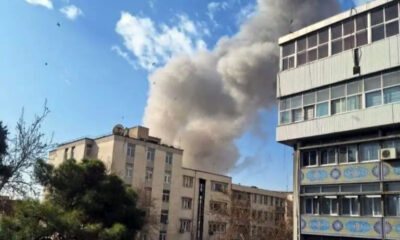
 International3 days ago
International3 days agoBREAKING: Israel Launches Pre‑emptive Strike on Iran, Explosions Reported Across Tehran
-
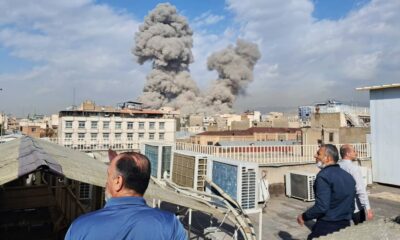
 International2 days ago
International2 days agoIran: US, Israel launch another strikes, Commander, Defence leader, five other top officials killed
-

 International2 days ago
International2 days agoMiddle East on Edge as Iran Retaliates Against Israel, U.S Bases
-

 International3 days ago
International3 days agoTrump Urges Iranians to Overthrow Government Amid US-Israeli Attacks
-

 International2 days ago
International2 days agoKamala Harris Slams Trump for Dragging U.S. Into ‘Unwanted War’ in Iran Conflict
-
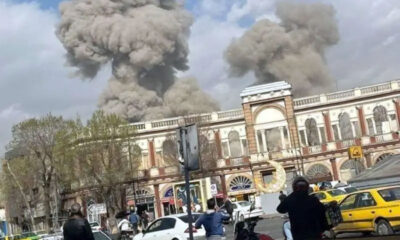
 International3 days ago
International3 days agoReports: US Forces Join Israeli Offensive Against Iran
-
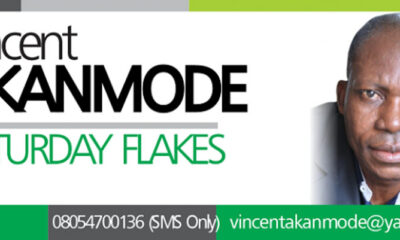
 Opinion3 days ago
Opinion3 days agoOur children must be kept away from Obi’s mob



